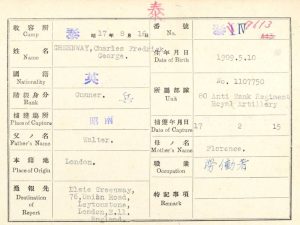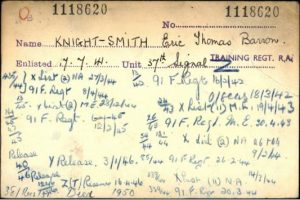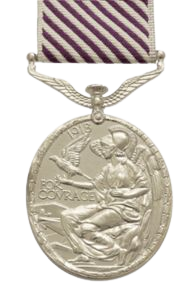Our subscribers have access to a diverse range of WWII records, from medal records and casualty collections to officer lists. Below are my top five records to help you learn more about your ancestors who served in uniform during WWII:
Allied Prisoners of War, 1939-1945 collection
Researching a prisoner of war? Our UK, Allied Prisoners of War, 1939-1945 collection comprises rolls and lists of prisoners of war held in Europe and Asia. Entries vary in scope and content: lists of prisoners held in Europe generally contain the person’s prisoner number, service number, name, rank, unit and camp code. The visually impressive index cards for prisoners held by the Japanese, however, contain significant military and genealogical information, helping you confidently identify your ancestor in the records. For a detailed look at the collection and how to research WWII prisoners of war, check out our blog: Researching a WWII prisoner of war: how our Allied Prisoners of War, 1939-1945 collection can help you.

Bomber and Fighter Command Losses, 1939-1945
We’ve heard from many people in our community whose family members served with the Royal Air Force and are looking for advice on researching them in our WWII records; here’s a vital collection. Our Bomber and Fighter Command losses collection concerns incidents relating to British and Allied aircrew during the war. Entries provide an insight into the incident, ranging from those who crash-landed to aircrew who were shot down and killed in action. In addition to the incident details, the collection may record the aircraft they were flying or operating in, its serial number, squadron details, rank, station and where the person was buried or commemorated. This allows you to add rich detail to your ancestors’ wartime story.
Royal Artillery Tracer Cards, 1939-1948
This is a great starting point if you’re researching an ancestor who served with the Royal Artillery during WWII. The fascinating collection comprises tracer cards created to track the movements of soldiers between regiments of the Royal Artillery during WWII. Their primary function was to pinpoint a soldier’s location quickly and efficiently. While service records are undoubtedly the most valuable source when researching an ancestor’s military service, you may not have your ancestor’s service record when you begin researching. This is where the tracer cards come in. The cards contain references, in date order, to the different regiments of the artillery that your ancestor served with, allowing you to plot their movements throughout the war. For a guide on how to use the tracer cards, see our dedicated tracer card blog.

Daily Reports: Missing, Dead, Wounded and POWs, 1939-1947
I’m a big fan of this collection and regularly use it when researching WWII casualties. The reports within this collection indicate when a person was wounded, missing, taken prisoner or died and where the incident occurred. Often, you’ll find multiple entries regarding the person’s status. Entries contain valuable military details and can help you add further colour and context to the timeline of your ancestor’s military service. All in all, a really valuable collection of WWII records.

Recipients of the Distinguished Flying Medal, 1939-1945
If you want a collection of WWII records that offers insight into incidents of bravery and heroics during WWII, then this collection is a must-search. The Distinguished Flying Medal (DFM) was awarded to other ranks of the RAF and Commonwealth air forces for acts of valour, courage or devotion to duty performed while flying in active operations against the enemy. Entries provide a full citation for the award in addition to the recipient’s name, number, rank, squadron and trade. If your ancestor was a recipient of the medal, it’s a great way to discover the amazing stories behind the awards.
Even if your ancestor wasn’t awarded the DFM, the citations make for fascinating reading for military history enthusiasts. From Dunkirk to D-Day, daring rescues at sea, and the war in the Far East, this collection is full of incredible acts of bravery.
Explore our WWII records and see who you discover – you never know what you’ll find until you get started.
Cover image credit: Tracer card © The Royal Artillery Museum and POW records © The National Archives.


